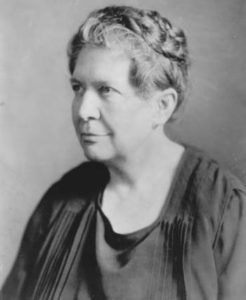
Florence Kelly
Florence Kelley was born on this date in 1859. She was a white-American activist for civil rights and social reform.
The daughter of United States congressman William D. Kelley, she studied at Cornell University and the University of Zurich. While in Europe, she became a follower of Karl Marx and Friedrich Engels. Kelley moved to New York City and then to Chicago with her three children. Soon after arriving in the city, she joined the social reformers at Hull House. John Peter Altgeld was one of the many visitors to Hull House, and when he was elected governor of Illinois in 1892, he appointed Kelley as the state's first chief factory inspector.
Kelley recruited a staff 12, and in 1894, they managed to persuade the state legislature to pass legislation controlling child labor. This included a law limiting women and children to a maximum of eight-hour days. A strong supporter of women's suffrage and American Civil Rights, Kelley helped to establish the National Association for the Advancement of Colored People (NAACP) in 1909. A committed pacifist, Kelley opposed the involvement of the USA in World War I and was a member of the Women's Peace Party (WPP) and the Women's International League for Peace and Freedom (WILPF).
Kelley wrote several books, including "Some Ethical Gains Through Legislation" (1905), "Modern Industry in Relation to the Family" (1914), "The Supreme Court and Minimum Wage Legislation" (1925), and "Autobiography" (1927). Florence Kelley died in Germantown, PA., on February 17, 1932.